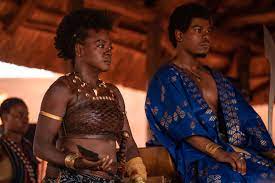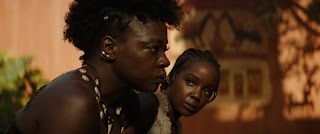THE WOMAN KING
How to judge a film that is a work of fiction, but which is apparently presented as historic fact? The Woman King is, to quote IMDB, "a historical epic that is based in alternate history", that of the Dahomey nation in Africa. There are some good performances and elements that do work, but The Woman King's script fails history though slightly better as art.
West Africa, 1823. The Dahomey nation, forced to pay tribute to their overlords the Oyo, has something of a secret weapon. They are the Agojie, an all-female warrior group who raid Oyo settlements to free captives bound for the slave trade. Their leader Nanisca (Viola Davis) is all business, forever fighting against neighboring nations to keep her people and her king, Ghezo (John Boyega) safe.
Into her group of Amazons comes Nawi (Thuso Mbedu), a girl thrown to the Agojie due to her refusal to marry an older, abusive man. Nanisca is not fond of Nawi, seeing her as willful and disobedient. Her second-in-command, Izogie (Lashana Lynch), however, seems fond of this girl. Rigorous training takes place for her and the other girls. As time goes on, however, Nanisca discovers a connection between herself and Nawi, a shameful secret from Nanisca's past. This motivates Nanisca to undertake her most daring mission, defying King and Country to save Nawi.
For her part, Nawi is willful, even more so when she finds herself attracted to Malik (Jordan Bolger), a biracial Brazilian who works for Santo Ferreria (Hero Fiennes Tiffin), a Portuguese slave trader. He has no issue selling Nawi and her fellow captive Agojie to the horrors of the peculiar institution, but he did not count on The Woman King.
The Woman King has been called out for its dubious historical accuracy. Director Gina Prince-Bythewood's take on pre-colonial Africa portrays the Agojie as fierce freedom fighters. The opening battle scene involves them rescuing women captured by the Oyo who were bound to the slave market. Once the Oyo men were defeated, they bring the women (even those not Dahomey) under their protection, while sending the men to slavery only as punishment.
Nanisca is at the forefront of opposing the slave trade regardless of whether the potential slave was Dahomey or not, and King Ghezo takes the ultimate stand at the end to not just defeat the Oyo but to stand against "the Europeans and Americans" when it comes to ending the subjugation of all Africans. This last bit is one of the strangest sections in Dana Steven's screenplay (from a story by her and actress Maria Bello).
The Woman King has no American characters, and from what I remember the United States was never mentioned by anyone. Moreover, Ghezo's primary interactions with Europeans were the Portuguese though there were brief mentions of the French and British. Add to that the fact that the United States was a mere 47 years old at the time The Woman King is set. For context, the War of 1812 had ended eight years prior to The Woman King's setting and the U.S. was not considered a major world power then.
Therefore, it seems bizarre to insane for Ghezo to care about the Americans, let alone mention them in his declaration to fight against them. I can leave a little leeway in perhaps his mention of "Americans" extended to the whole of the New World, but that's a stretch.
If Wikipedia, Fount of All Knowledge, is to be believed, the Dahomey Amazons were not freedom fighters but instrumental in sending their fellow Africans into slavery in the Americas. For his part, Ghezo was extremely reluctant to end the lucrative slave trade. It was a source of wealth for him, and I figure King Ghezo would not lose sleep if neighboring Mahi or Oyo people were sent off to be slaves as they would be foreigners to him.
The Woman King, however, opts to present a highly fictionalized version of the Agojie and Dahomey as a whole, and that is troubling. There is a strange irony that the descendants of Dahomey victims are now cheering those who sent their ancestors into slavery as heroines. If Stevens' script had created an evolution in Nanisca's thinking to where she came to see the evil of her work in capturing her fellow Africans for the Europeans, we might have had a genuine movie.
Instead, what we have in The Woman King is what the film's closing credits admits is fiction. I personally am troubled by how many critics dismiss the film's historical presentation as "some inaccuracies". All historic films have inaccuracies, and despite the saying I suspect even documentaries are not one hundred percent accurate. Those who called out films like Braveheart and Green Book for their oddball takes to facts (rightly and fairly in my view) should also be more upfront about The Woman King's wild liberties with fact.
There were other aspects that I thought weakened The Woman King. The dialogue seemed rather elevated and grand, which to my ears did not come across as people actually speaking. The twist connecting Nanisca and Nawi comes if not out of nowhere at least highly illogical and unnecessary. Why not have Nanisca play a mother figure/mentor to Nawi versus what the film gave us? That subplot did not work for me, but it was much better than the Malik/Nawi romance, which was the weakest part of The Woman King. It went nowhere and frankly either could have been cut or should have been beefed up. Instead, it was just there as an afterthought, making the film feel even longer than its already two-hour-fifteen-minute running time.
Boyega is so unimportant to The Woman King one wonders why he is there other than to look good and because even this alternate take on history requires him to be there.
That is not to say that The Woman King is a bad film. There are elements that I thought worked quite well. Mbedu and especially Lynch are standouts in their roles. Mbedu's Nawi at times is a little insufferable, but that is more the character than the actress. She makes the most of Nawi's fear, loyalty and curiosity about Malik. It is, if not a star-making performance at least one that will hopefully get her more work.
Like Mbedu, Lynch also shines as Izogie. I think it is because like Mbedu's Nawi, Lynch has a character to play. Izogie is not comic relief but someone who comes across as a genuine person. She is fierce and strong as one of the Dahomey Amazons, but Izogie is also playful, both amusing and amused. We see this early on when the Agojie march back to their capital. A boy is told he cannot look upon them, but he cannot resist a quick peek. Izogie spots him and comes at him. A brief standoff results in her smiling at the boy and teasingly playing with his hair.
I do not understand the praise Davis has been receiving. Her character was one-note, forever glum and serious. The film did try to give her a backstory and thus more shades of humanity, but I thought it was too little, too late. Moreover, it came out of nowhere and I was not convinced. It is nice to see Davis in an action role, but I think her talents could have been put to better use. Her permanent scowl and pursed lips brought back memories of The First Lady, where even fans of the now-cancelled anthology series thought Davis' Michelle Obama came across as perpetually pissed off.
Terence Blanchard's score was appropriately rousing, and I thought the action scenes worked well as did Polly Morgan's cinematography.
I might be more generous when it comes to The Woman King if not for its revisionist take on history. No historical film should be taken as completely accurate. However, when you take a group that was deeply involved in the slave trade and transform them into anti-slave freedom fighters, that goes a bit beyond "historical inaccuracies". If it were upfront about it being "alternate" history or even "inspired by true events", I might be more disposed to like it more. Separate from some of its other failings such as some subplots that go nowhere, The Woman King falls just a bit short.
There is a story to be made on the Dahomey Amazons, warts and all. I hope to see it someday.
.jpg)



No comments:
Post a Comment
Views are always welcome, but I would ask that no vulgarity be used. Any posts that contain foul language or are bigoted in any way will not be posted.
Thank you.